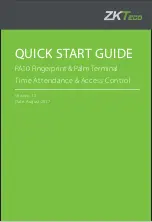
RV Power Products - Solar Boost 3048
3
PRODUCT DESCRIPTION
Solar Boost™ 3048 is a 30 amp 24/48 volt
Maximum Power Point Tracking
(MPPT) photovoltaic (PV) charge
controller. Through the use of patented MPPT technology, Solar Boost 3048 can increase charge current up to 30% or
more. Solar Boost 3048’s sophisticated three stage charge control system can be configured to optimize charge
parameters to precise battery requirements based on battery electrolyte type, battery size in amp-hours, and battery
temperature. The system is fully protected against voltage transients, over temperature, over current, and reverse
battery and reverse PV connections. A manual equalize function is also included to periodically condition flooded lead-
acid batteries.
Solar Boost 3048 employs series pass
Pulse Width Modulation
(PWM) charge voltage control. The advanced
multistage charge control system combined with precise PWM voltage control leads to superior charging and enhanced
battery performance. To provide optimum charge control on installations where battery load varies widely during
charge, Solar Boost 3048 can interface to an external current shunt to provide optimal charge control. Solar Boost 3048
also includes an automatic current limit feature which allows use of the full 30 amp capability without worrying about
overload or nuisance fuse blow from excessive current. The PWM control system uses highly efficient and reliable
power MOSFET transistors. The MOSFET’s are turned on and off at high frequency to precisely control charge voltage
and MPPT. Environmentally sealed high current high reliability relays are used to disconnect the PV array at night to
prevent unwanted current drain. Relays are used rather than blocking diodes for improved power conversion efficiency,
current boost performance, and true reverse battery polarity protection in an MPPT controller. The relays are not
stressed by functioning as part of the voltage control system and continually turning on and off as with other PV
controllers. They simply turn on in the morning and off in the evening, and in this application have a life expectancy in
excess of 10
5
operations.
Since Solar Boost 3048 is a high efficiency series pass “buck” type power converter with current limit, the battery
can be charged from any power source with a voltage greater than the desired acceptance voltage setpoint, and less
than the maximum PV open circuit voltage rating of 127 volts. Examples of this type of use include charge control from
hydroelectric or wind generators, or charging a 24 volt battery from a 48 volt system.
Fully automatic temperature compensation of charge voltage is available as an option to further improve charge
control and battery performance. The available SensorLug™ battery temperature sensor is built for long term reliability.
The sensor element is environmentally sealed and encapsulated into a copper lug which mounts directly to the battery
terminal. A user friendly digital display is also available to monitor PV charge performance. The display may be
provided in the Solar Boost 3048 controller, as a remote panel, or both. The remote panel cable may be up to
300ft/91.4m in length.
PART NUMBERS AND OPTIONS
•
SB3048........................... Solar Boost 3048 controller without digital display
•
SB3048D ........................ Solar Boost 3048 controller with digital display
•
SB50RD25 ..................... SB3048 remote digital display with 25’ cable (standard duplex box mount)
•
SB3048PD...................... SB3048D front panel with digital display (add to SB3048 to make SB3048D)
•
930-0022-20................... SensorLug™ battery temperature sensor with 20’ cable
•
CS-100 ........................... 100A/100mV current shunt
•
CS-200 ........................... 200A/200mV current shunt
•
CS-500 ........................... 500A/50mV current shunt
OPERATION
During installation the Solar Boost 3048 will have been configured to operate in a 24 or 48 volt system, and
for three stage or two stage charge. Additional items which may be configured during installation include;
acceptance and float voltage setpoints, battery amp-hour capacity, temperature compensation and whether full
charge is determined using the internal current shunt or an optional external current shunt.





































